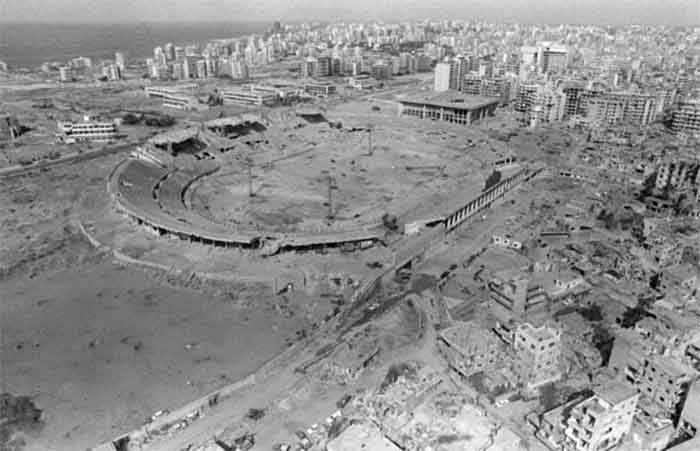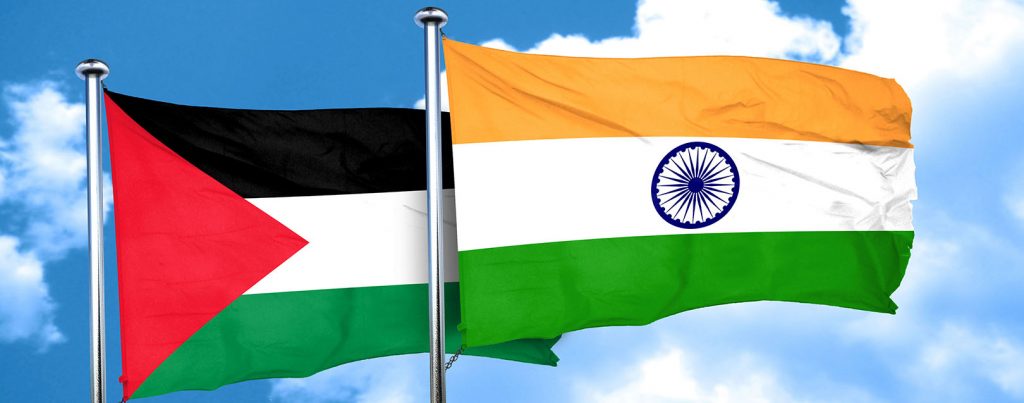(This is part of my memoir I published successively on the pages of Countercurrents on the Zionist invasion of Lebanon 1982 )

We were handcuffed, and a bandage was placed over our eyes so we could not see anything. Then the buses moved towards Palestine. Next to me was sitting an Egyptian named Gamal. He had nothing on his eyes, perhaps being Egyptian and a kind of courtesy to Egypt, which had signed a peace treaty with the Zionist state in 1979.
Jamal told me we were traveling on the Palestinian coast because he could see the traffic directions.
I remember the direction of the road, although I saw nothing. Because we traveled along the coast a few hours, turning left on a road that seemed somewhat mountainous because the bus was moving uphill.
The heavily armed soldiers were guarding us. And from time to time, they would ask us to chant, Arafat dies, long live Sharon. Ariel Sharon was the Minister of (Defense) of the Zionist state. The man protected the perpetrators of the Sabra and Satilla massacre, which occurred later when we were still in prison and heard about it from coming prisoners.
During the trip, the bus stopped, and Zionist women came in and started beating us, screaming that we were (saboteurs), which the Zionists call the men of the Palestinian resistance.
The name saboteurs are really ridiculous. Palestinians do not destroy their homeland because they built it with the sweat of generations.
The oversee Zionists occupied Palestine, a furnished apartment with all the infrastructure, from railways to three airports to national currency, modern streets, organized cities, etc.
Even if we compare it with other colonizing projects, such as in the (new world!), which became the USA, Canada, and Australia. Palestine was much developed.
The Jewish Zionist colonists, unlike their colleagues, the European colonists, got a readymade country. And the criminal invaders call the native Palestinians saboteurs, while the Zionists are the real saboteurs.
The Zionists came to Palestine with the help of the British Mandate, which was supposed to be the guardian of Palestine until it gained independence.
But the British betrayed us and instead they began to fill the country with oversees Zionist Jews. And now the British bards preach us about human rights, shame on them!
The Clashes erupted early with the Zionists because Palestinians realized the goal of the Zionist project. Which is the replacement of Zionist Jews with the native inhabitants of Palestine. The Zionists began to use methods not known, neither in Palestine nor in the Middle East as a whole.
They place explosive cars in vegetable markets in Haifa and elsewhere. This was strange to Palestinian culture because it had not happened before.
This was the beginning of the Zionist brutality. And what we see nowadays is nothing but a continuation of this brutality.
As I write these memoirs, the world witnessed how the Zionists deliberately killed the Palestinian journalist, Shireen Abu Akle, and continued the crime by attacking the young men carrying her coffin.
And even though Palestinians experienced the Zionist’s cruelty, we never thought that they reached this level of savageness as the world saw the Zionist army attacking the coffin of Shireen Abu Akle on screens.
We know that in all cultures, there is respect for the dead person in their last journey. But the Zionists demonstrate that they do not regard humans as dead or alive.
At that time, while we were in the jail, the war was still going on, and Beirut was besieged by land and sea. The Zionist tanks were trying to enter Beirut but to no avail. Then they would stop advancing and bomb with planes and destroy entire buildings using cluster bombs.
Then the tanks would advance again, and the fighters fought them back, and the planes come to bomb again, and so on. We used to hear the news while in the camp before the arrest. And later from the new prisoners.
We also knew the situation in Beirut through the mood of the Israeli soldiers. If they started beating us hard, we knew that their military situation was uncomfortable.
The buses continued on their way. I was exhausted because I did not sleep well during the three days I spent in the orange factory. In addition, we were all-time in a state of terror and anxiety.
The smell of sweat was strong from the detainees because it was summer and no one was allowed to take a bath. . After a few hours, we reached a low valley in Megiddo, which the detainees called Al-Jura.
One of the paradoxes is that Megiddo was in the year 1500 BC, the scene of a great war between the Canaanite tribes and the Egyptian pharaoh. Where the Canaanite tribes united in confronting the Egyptian invasion.
Another paradox is that my father served as a soldier in that place in the Palestine army under British Mandate.
As soon as we reached Al-Jura , the soldiers received us with severe beatings. The first thing they did was to remove the blindfold and hit us everywhere on the body.
Since my eyes are covered all the time, one needs some time to see after removing the blindfold. And as soon as I got out, the soldier began to beat me.
That was the first time in my life that someone beat me. I felt like hitting him back, but I restrained myself because I knew this might lead to my death.
In front of me was the farmer or the keeper of the lemon orchard, and he was a kind man. In earlier times, we used to go and read among the orchards, a widespread culture among Palestinian students at the time, but it has disappeared now.
Sometimes he would give us oranges or bananas and encourage us to study, and we always appreciated that. He was a tall man. Two Zionists attacked him and started to beat him. He was shouting that he is a farmer, and the Zionist shout at him by saying, “You are a great saboteur.”
I was watching this, knowing that my turn would come after him, which happened after a short time. The soldiers started beating me all over my body, and I tried as much as possible not to scream, but I did because of the pain, no matter how hard I tried to control myself.
Afterward, they ordered us to take off all our clothes. That was a big surprise for us. Some said they would bury us alive, as the Zionists did with soldiers in the Egyptian army in 1967.
But soon came a soldier with a pump and started spraying us for fear of spreading infectious diseases, as we were told.
There was a Lebanese man who worked as traffic police, his name is Abu Kazem. They arrested him in random arrest campaigns. He said that they treat us as if we were insects, and that was the truth.
As soon as we had breakfast, the interrogation began. The Zionists sent us one by one to the interrogation room. In front of the room were three officers with papers in front them. And inside the room were two interrogators.
When it was my turn, I entered the room, and the beating began immediately without saying a word. The physical torture lasts for about a quarter of an hour, and perhaps the aim is to terrorize me.
He asked me about my profession?
I said I teach English literature. Then asked me do u teach Shakespeare? I said yes .He started beating me. I did not know why he beat me just as I answered him, but later on, I heard from a friend that Shakespeare did not like Jews and I do not know until now if that is the reason he beat me after I told him that .
I know that Jews are hated in several cultures throughout history. I am firmly against the hatred of any human being, but I am not ready to accept the assumption that the persecution of Jews in Europe gives them the right to persecute us.
I said I teach in a known college in Tyr and had the college card, but they took it from me.
He asked where I learned English. At the Lebanese university. I said. As soon as I said that, as if a question jumped to his mind. Then you are you member in the Palestinian student union. He shouted at me!
I was indeed active in the Palestinian Student Union when I was a student. But I was not active at that time because I had finished my studies, so I said, No, I am not.
He did not believe me, so he beat me and told me he could bury me in this place.
Then he asked me whether I had read the charter of the Palestinian Liberation Organization.
I said yes, I did. What does it say? He asked, and I said it calls for establishing a democratic state in Palestine for all Muslims, Christians, and Jews on an equal footing.
He said this means u want to dissolve Israel!
He began hitting me again. While I was beaten, I said aloud that my people were oppressed and they had the right to live free. I felt satisfied with myself despite all the beating.
I burst because I could not bear the humiliation. There is no power on earth that can strip me of my dignity.
One of the sick detainees was an old man who asked me to translate in English to the officer that my uncle could not sit in the hot sun because the heat was severe.
I translated, and the officer said, so you and your uncle are saboteurs! He does not know that we say uncle in our culture to refer to an old man.
They are strangers to the culture. They are stranger to the land. They are strangers to the trees and birds in Palestine. The Zionist myth and falsification will never change the reality that they are in Palestine only because they have power and a strong killing machine.
We were beaten at any time following the soldiers’ mood. After that, they transferred us to another detention camp.
Salim Nazzal is a Palestinian Norwegian researcher, lecturer playwright and poet, wrote more than 17 books such as Perspectives on thought, culture and political sociology, in thought, culture and ideology, the road to Baghdad. Palestine in heart












































